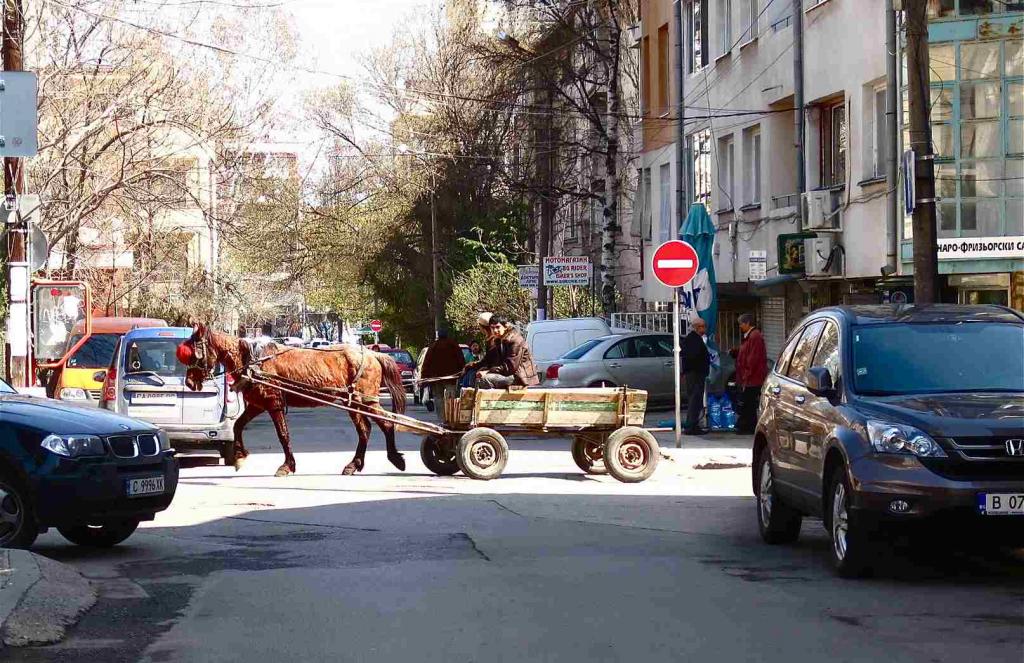Thessaloniki gets ready for its metro launch in November
The underground rapid transit lines have been under construction for almost two decades due to various project delays
 TheMayor.EU logo
TheMayor.EU logo 
Horse carts were a common sight on Sofia streets but a new ordinance aims to make them extinct, Source: Amy Denio, on Flickr (CC BY-NC-ND 2.0)
Traffic violators will have their animals confiscated “for safekeeping”
As of today, 1 June, there will be no more commuting on horse-drawn carts and wagons on the streets of the Bulgarian capital, Sofia. The city authorities have finally stepped ahead with their plans to ban these types of vehicles and exclude them from the traffic circulation.
In cases of violations, the competent authorities will detain in custody the vehicle until it is requested by the owner and will return it after payment of the relevant fines. The animals used to pull the vehicles will be handed over to Ekoravnovesie, a municipal firm usually tasked with managing the homeless animal situation in the city. The horses or donkeys will also be returned to the owner after they pay the care and treatment costs.
In reality, this is an expansion of the ban ordinance which was introduced in February and prohibited these vehicles from the downtown area, though infractions were still common. The new ordinance declares the entire territory of the city a horse-cart-free area.
This means that visitors to the city will no longer be able to enjoy the exotic sight of horse carts merging in and out of traffic on the streets of a modern European capital. In fact, the cited reason for the necessary prohibition of these vehicles was their frequent traffic violations, which endanger their safety and that of other drivers and pedestrians.
The ban is imposed due to frequent violations of cart drivers such as not yielding to motorized traffic, driving on sidewalks, and even moving in the opposite traffic lane. In addition, horses and mules used as draft animals are almost always poorly cared for, malnourished, ill and rarely provided with the necessary veterinary care.
These were the arguments presented for the proposed ban according to municipal councillors Carlos Contreras and Borislav Ivanov, during a discussion of the measure at City Hall back in February. The authorities now expect improved traffic, road safety and cleanliness following the ban, as carts were also often used to transport and smuggle waste illegally.

The underground rapid transit lines have been under construction for almost two decades due to various project delays

Now you can get your wine in Talence by paying directly in Bitcoin

That’s because the state has to spend money on updating the railway infrastructure rather than subsidizing the cost of the popular pass

Rethinking renewable energy sources for the urban landscape

The examples, compiled by Beyond Fossil Fuels, can inform and inspire communities and entrepreneurs that still feel trepidation at the prospect of energy transition

Now you can get your wine in Talence by paying directly in Bitcoin

The 10th European Conference on Sustainable Cities and Towns (ESCT) sets the stage for stronger cooperation between the EU, national and local level to fast track Europe's transition to climate neutrality.

At least, that’s the promise made by the mayor of Paris, Anne Hidalgo

The underground rapid transit lines have been under construction for almost two decades due to various project delays

At least, that’s the promise made by the mayor of Paris, Anne Hidalgo

Hostal de Pinós is located in the geographical centre of the autonomous region

Despite its church-y name, the district has long been known as the hangout spot for the artsy crowds

Urban dwellers across the EU are having a say in making their surroundings friendlier to people and the environment.

Forests in the EU can help green the European construction industry and bolster a continent-wide push for architectural improvements.

Apply by 10 November and do your part for the transformation of European public spaces

An interview with the Mayor of a Polish city that seeks to reinvent itself

An interview with the newly elected ICLEI President and Mayor of Malmö

A conversation with the Mayor of Lisbon about the spirit and dimensions of innovation present in the Portuguese capital














